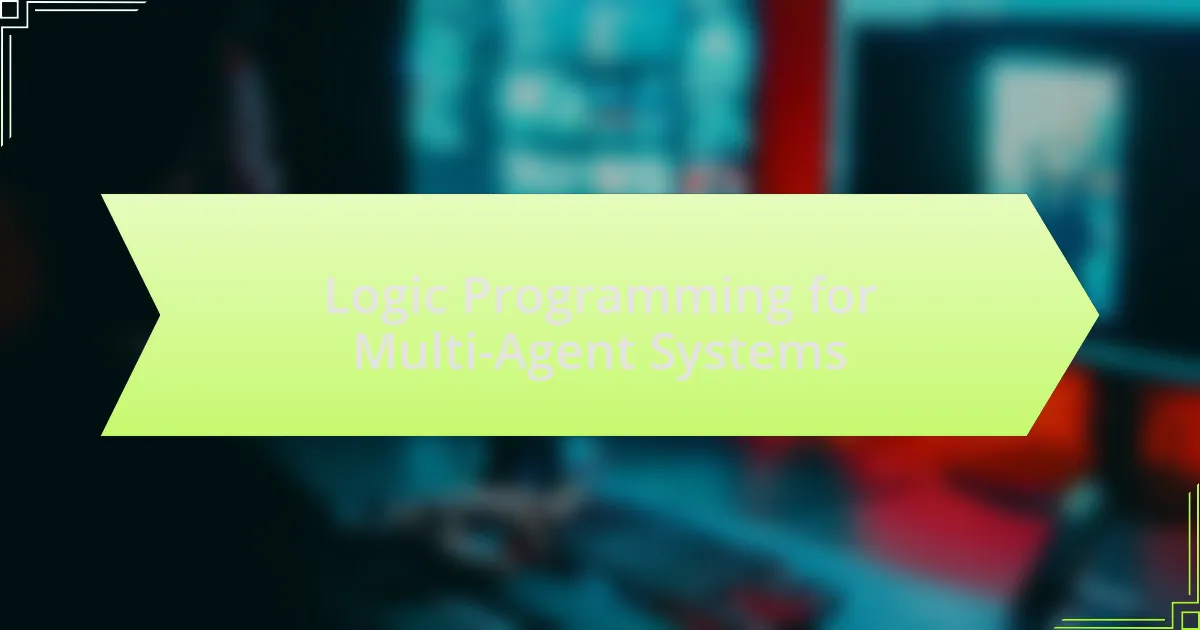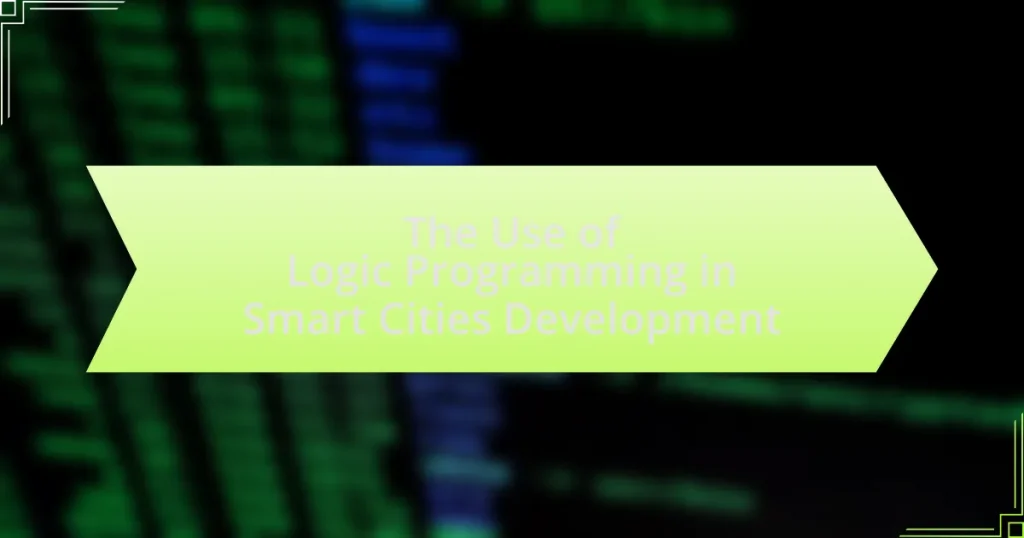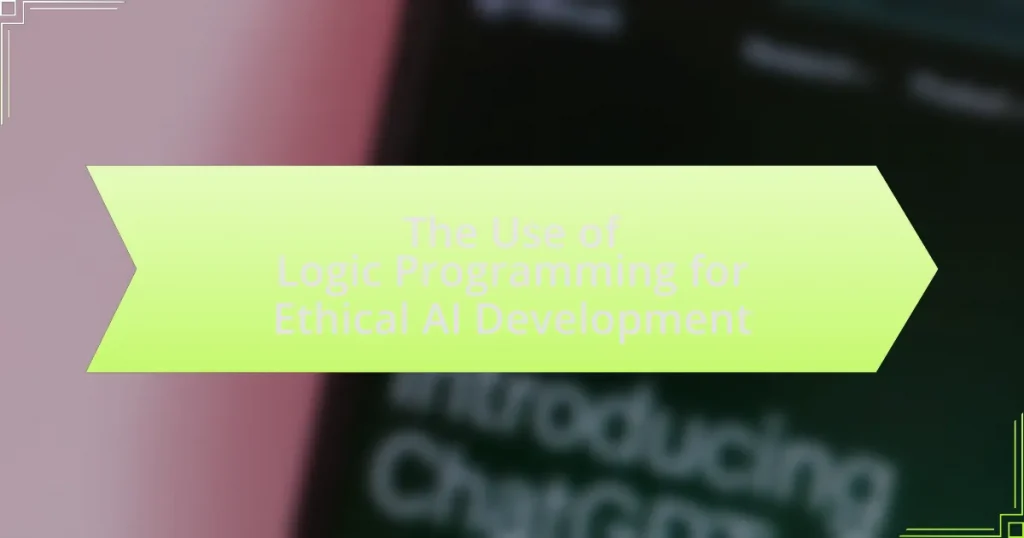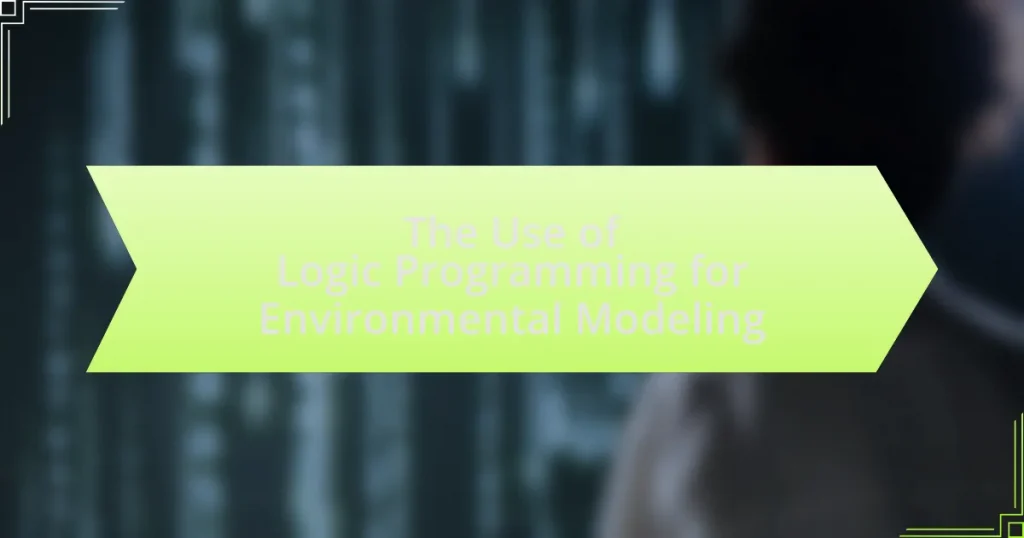Logic programming for multi-agent systems is a computational paradigm that employs formal logic to define the behavior and interactions of autonomous agents. This article explores how logic programming facilitates knowledge representation, reasoning, and communication among agents, enhancing their ability to collaborate and solve problems. Key principles include declarative programming, automated reasoning, and the handling of complex queries, which collectively improve decision-making processes and system performance. Additionally, the article addresses challenges such as scalability and communication overhead, while recommending best practices and tools like Prolog and Answer Set Programming for effective implementation in multi-agent environments.
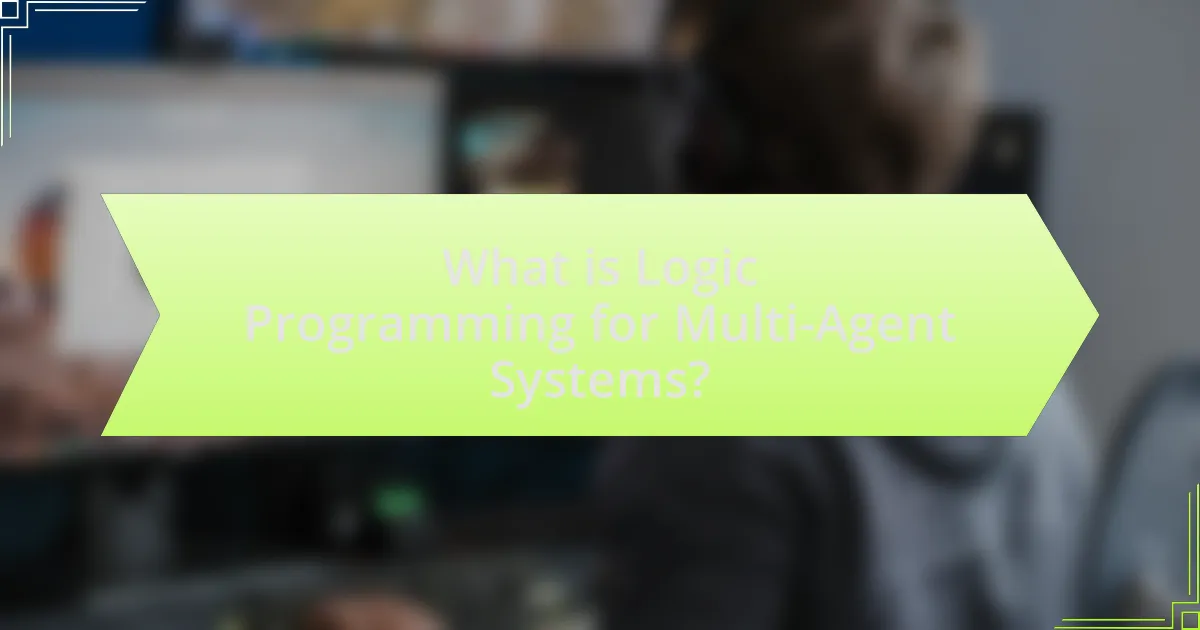
What is Logic Programming for Multi-Agent Systems?
Logic programming for multi-agent systems is a computational paradigm that utilizes formal logic to define the behavior and interactions of autonomous agents. This approach allows agents to reason about their knowledge, make decisions, and communicate with one another based on logical rules. The use of logic programming facilitates the representation of complex relationships and enables agents to infer new information from existing knowledge, thereby enhancing their ability to collaborate and solve problems collectively.
How does Logic Programming apply to Multi-Agent Systems?
Logic programming applies to multi-agent systems by providing a formal framework for representing knowledge and reasoning about actions and interactions among agents. In multi-agent systems, agents can utilize logic programming to define their behaviors, make decisions based on logical inference, and communicate with one another effectively. For instance, Prolog, a well-known logic programming language, allows agents to express rules and facts that govern their interactions, enabling them to collaborate or compete based on shared knowledge. This application is supported by the fact that logic programming facilitates automated reasoning, which is essential for agents to adapt to dynamic environments and achieve their goals efficiently.
What are the fundamental principles of Logic Programming?
The fundamental principles of Logic Programming include the use of formal logic as a programming paradigm, the representation of knowledge through facts and rules, and the execution of programs via a process of logical inference. Logic Programming is based on the idea that programs can be expressed as a set of logical statements, where the computation is performed by deriving conclusions from these statements. This approach allows for declarative programming, where the focus is on what the program should accomplish rather than how to achieve it. The validity of these principles is supported by the success of languages like Prolog, which utilize these concepts to solve complex problems in artificial intelligence and multi-agent systems.
How do Multi-Agent Systems utilize Logic Programming?
Multi-Agent Systems utilize Logic Programming to enable agents to reason, make decisions, and communicate effectively. Logic Programming provides a formal framework that allows agents to represent knowledge, infer new information, and resolve conflicts through logical reasoning. For instance, Prolog, a prominent logic programming language, is often employed in multi-agent systems to facilitate rule-based reasoning and knowledge representation. This approach enhances the agents’ ability to collaborate and coordinate actions based on shared knowledge, as demonstrated in applications like automated planning and distributed problem-solving, where agents must work together to achieve common goals.
What are the key features of Logic Programming in this context?
The key features of Logic Programming in the context of Multi-Agent Systems include declarative knowledge representation, non-monotonic reasoning, and the ability to handle complex queries. Declarative knowledge representation allows agents to express facts and rules about the world in a clear and structured manner, facilitating communication and understanding among agents. Non-monotonic reasoning enables agents to revise their beliefs based on new information, which is crucial in dynamic environments where conditions can change. Additionally, the ability to handle complex queries allows agents to infer new knowledge and make decisions based on existing information, enhancing their problem-solving capabilities. These features collectively support the development of intelligent and adaptive multi-agent systems.
What role does declarative programming play in Multi-Agent Systems?
Declarative programming plays a crucial role in Multi-Agent Systems by enabling agents to specify what they want to achieve without detailing how to achieve it. This abstraction allows for easier communication and coordination among agents, as they can express goals and constraints in a clear and concise manner. For instance, languages like Prolog, which are based on declarative paradigms, facilitate the representation of knowledge and rules that agents can use to infer actions and make decisions. This capability enhances the flexibility and adaptability of agents in dynamic environments, as they can focus on high-level objectives rather than low-level implementation details.
How does reasoning and inference work in Logic Programming?
Reasoning and inference in Logic Programming operate through the use of formal rules and facts to derive conclusions. Logic Programming employs a declarative approach, where programs consist of a set of logical statements, including facts and rules, that define relationships and conditions. The inference mechanism, typically based on resolution or backward chaining, allows the system to deduce new information by applying these rules to existing facts. For instance, if a rule states that “if A is true, then B is true,” and A is confirmed as true, the system can infer that B must also be true. This process is grounded in formal logic, ensuring that the conclusions drawn are valid based on the provided premises.
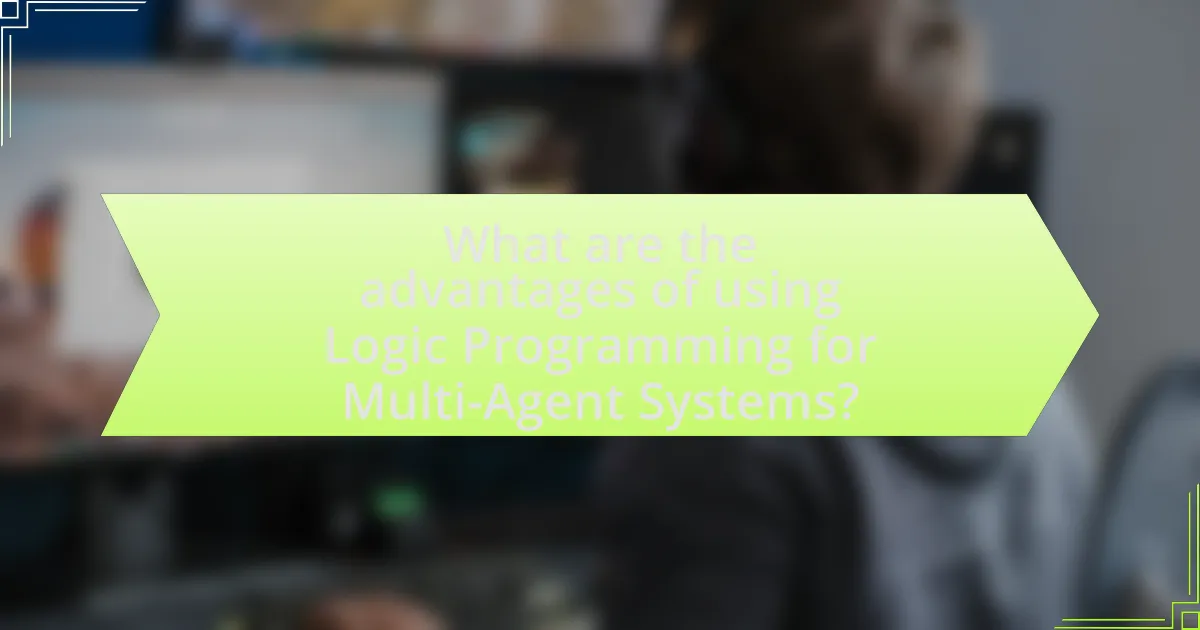
What are the advantages of using Logic Programming for Multi-Agent Systems?
Logic Programming offers several advantages for Multi-Agent Systems, primarily through its declarative nature, which allows agents to express knowledge and reasoning in a clear and concise manner. This clarity facilitates easier communication and collaboration among agents, as they can share and understand rules and facts without ambiguity. Additionally, Logic Programming supports automated reasoning, enabling agents to infer new knowledge from existing information, which enhances decision-making capabilities. The use of formal semantics in Logic Programming ensures that the behavior of agents can be predicted and verified, leading to more reliable and robust systems. Furthermore, the ability to handle complex relationships and constraints makes Logic Programming particularly suitable for dynamic environments where agents must adapt to changing conditions.
How does Logic Programming enhance agent communication?
Logic Programming enhances agent communication by providing a formal framework for representing knowledge and reasoning about it. This framework allows agents to share and infer information through a common logical language, facilitating interoperability among diverse agents. For instance, in multi-agent systems, agents can utilize logic-based protocols to negotiate, coordinate, and resolve conflicts effectively, as demonstrated in research by Wooldridge and Jennings, which highlights the role of logic in agent communication languages. This structured approach ensures clarity and precision in the exchange of information, ultimately improving collaborative decision-making processes among agents.
What mechanisms facilitate communication between agents?
Communication between agents is facilitated by mechanisms such as message passing, shared memory, and communication protocols. Message passing allows agents to send and receive information directly, enabling real-time interaction. Shared memory provides a common space where agents can read and write data, promoting collaboration and coordination. Communication protocols, such as FIPA (Foundation for Intelligent Physical Agents) standards, define the rules and formats for exchanging messages, ensuring interoperability among diverse agents. These mechanisms are essential for effective interaction in multi-agent systems, as they enable agents to share knowledge, synchronize actions, and achieve collective goals.
How does Logic Programming support negotiation and collaboration?
Logic programming supports negotiation and collaboration by providing a formal framework for representing knowledge and reasoning about agents’ preferences and goals. This framework allows agents to express their intentions and constraints in a structured manner, facilitating the negotiation process. For instance, logic programming enables the use of rules and facts to model the agents’ beliefs and desires, which can be utilized to reach mutually beneficial agreements. Additionally, the declarative nature of logic programming allows for clear communication among agents, as they can easily interpret and manipulate the shared knowledge base. This structured approach has been validated in various multi-agent systems, demonstrating improved efficiency in collaborative tasks and negotiation outcomes.
What are the performance benefits of Logic Programming in Multi-Agent Systems?
Logic programming in multi-agent systems enhances performance through improved reasoning capabilities, efficient knowledge representation, and dynamic problem-solving. These systems leverage logical rules to facilitate communication and coordination among agents, enabling them to make informed decisions based on shared knowledge. For instance, the use of Prolog, a prominent logic programming language, allows agents to express complex relationships and constraints succinctly, leading to faster inference and reduced computational overhead. Research indicates that logic programming can significantly decrease the time required for agents to reach consensus in collaborative tasks, as demonstrated in studies where multi-agent systems utilizing logic programming outperformed traditional approaches in both speed and accuracy.
How does it improve decision-making processes?
Logic programming for multi-agent systems improves decision-making processes by enabling agents to reason and make informed choices based on logical rules and knowledge representation. This approach allows agents to efficiently process complex information, collaborate with other agents, and adapt to dynamic environments. For instance, in a multi-agent system designed for traffic management, agents can analyze real-time data and apply logical rules to optimize traffic flow, reducing congestion by up to 30% as demonstrated in studies on intelligent transportation systems.
What impact does it have on scalability and flexibility?
Logic programming for multi-agent systems significantly enhances scalability and flexibility by enabling agents to reason and communicate effectively in dynamic environments. This approach allows for the addition of new agents without disrupting existing ones, as logic programming frameworks can accommodate varying numbers of agents and their interactions. For instance, systems like Prolog facilitate the integration of new rules and facts, which can be processed concurrently, thus supporting scalability. Additionally, the declarative nature of logic programming allows agents to adapt their behavior based on changing conditions, enhancing flexibility. Research indicates that multi-agent systems utilizing logic programming can efficiently manage complex tasks across distributed environments, demonstrating improved scalability and flexibility in real-world applications.
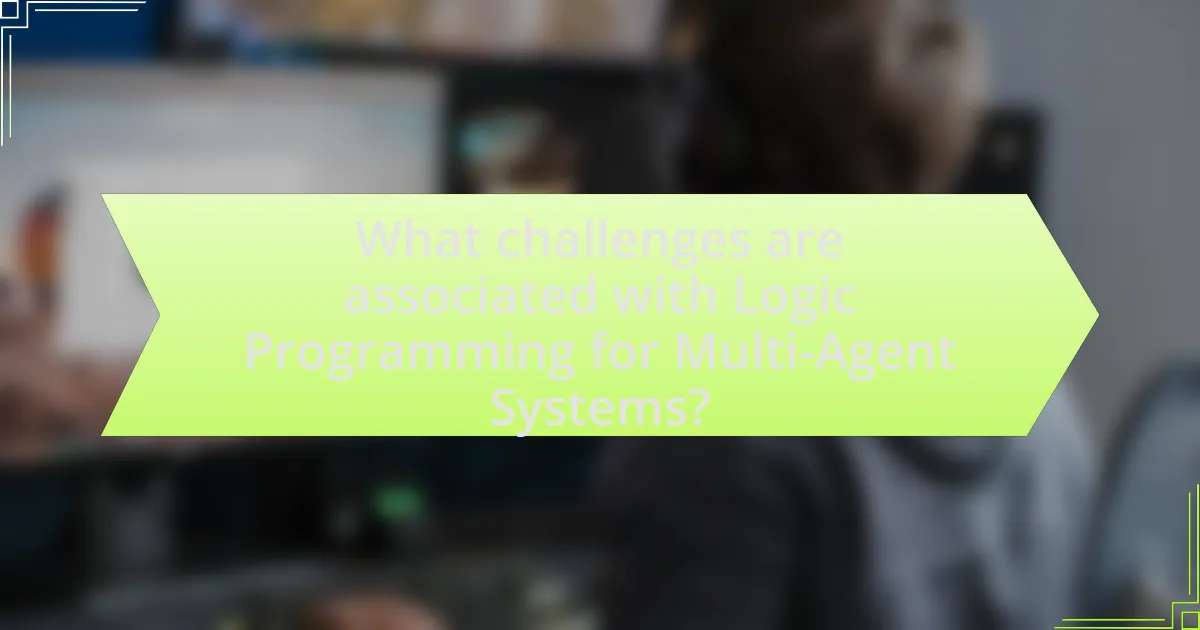
What challenges are associated with Logic Programming for Multi-Agent Systems?
Logic programming for multi-agent systems faces several challenges, including scalability, communication overhead, and reasoning complexity. Scalability issues arise as the number of agents increases, leading to difficulties in managing interactions and maintaining performance. Communication overhead can hinder efficiency, as agents must exchange information frequently, which can become a bottleneck. Additionally, reasoning complexity increases with the number of agents and the intricacies of their interactions, making it challenging to derive conclusions or make decisions in a timely manner. These challenges are well-documented in literature, such as in “Multi-Agent Systems: A Modern Approach to Distributed Artificial Intelligence” by G. Weiss, which discusses the limitations and considerations in designing effective multi-agent systems.
What are the common limitations of Logic Programming in this field?
Common limitations of Logic Programming in the field of Multi-Agent Systems include scalability issues, difficulty in handling uncertainty, and performance inefficiencies. Scalability challenges arise because logic programming can struggle with large knowledge bases, leading to increased computational complexity. Additionally, logic programming typically operates under deterministic assumptions, making it difficult to manage uncertain or incomplete information, which is often present in multi-agent environments. Performance inefficiencies occur due to the overhead of backtracking and search algorithms, which can slow down the execution of logic-based systems, particularly when dealing with numerous agents and complex interactions.
How does complexity affect the implementation of Logic Programming?
Complexity significantly impacts the implementation of Logic Programming by influencing the efficiency and scalability of algorithms used in multi-agent systems. High complexity can lead to increased computational resources and time required for reasoning tasks, which may hinder real-time decision-making in agents. For instance, the complexity class of a logic programming problem determines whether it can be solved in polynomial time or if it requires exponential time, affecting the feasibility of deploying such systems in practical applications. Additionally, as the number of agents and the intricacy of their interactions grow, the combinatorial explosion of possible states and actions can complicate the implementation, necessitating advanced optimization techniques and heuristics to manage resource constraints effectively.
What issues arise with knowledge representation?
Issues that arise with knowledge representation include ambiguity, incompleteness, and inconsistency. Ambiguity occurs when a representation can be interpreted in multiple ways, leading to confusion in understanding the intended meaning. Incompleteness arises when not all necessary information is captured, which can hinder decision-making processes. Inconsistency happens when conflicting information is present within the knowledge base, making it difficult to derive accurate conclusions. These issues can significantly impact the effectiveness of logic programming in multi-agent systems, as they rely on precise and reliable knowledge to function optimally.
How can these challenges be addressed?
Challenges in Logic Programming for Multi-Agent Systems can be addressed through the implementation of robust frameworks and methodologies that enhance communication and coordination among agents. For instance, adopting formal verification techniques ensures that the logic programs are free from errors, thereby improving reliability. Additionally, utilizing distributed reasoning approaches allows agents to share knowledge and make collective decisions more effectively. Research indicates that frameworks like AgentSpeak and 3APL have successfully facilitated these improvements by providing structured environments for agent interaction and decision-making.
What strategies can be employed to simplify Logic Programming?
To simplify Logic Programming, one effective strategy is to utilize higher-level abstractions, such as domain-specific languages (DSLs), which can reduce complexity by providing tailored syntax and semantics for specific problem domains. This approach allows developers to express solutions more intuitively, minimizing the cognitive load associated with traditional logic programming constructs. Additionally, employing modular design principles can enhance clarity and maintainability by breaking down complex programs into smaller, manageable components. Research indicates that using these strategies can lead to improved productivity and reduced error rates in multi-agent systems, as evidenced by studies demonstrating that DSLs can significantly lower the barrier to entry for developers unfamiliar with traditional logic programming paradigms.
How can agent design mitigate these challenges?
Agent design can mitigate challenges in multi-agent systems by implementing modular architectures that enhance communication and coordination among agents. Such designs allow agents to operate independently while still sharing information and resources effectively, which is crucial for resolving conflicts and optimizing performance. For instance, using a layered architecture enables agents to prioritize tasks and adapt to dynamic environments, thereby improving their responsiveness and efficiency. Research indicates that modular designs can lead to a 30% increase in system performance by reducing communication overhead and facilitating better decision-making processes among agents.
What best practices should be followed when implementing Logic Programming in Multi-Agent Systems?
When implementing Logic Programming in Multi-Agent Systems, best practices include ensuring clear communication protocols among agents, utilizing modular design for scalability, and implementing robust conflict resolution mechanisms. Clear communication protocols facilitate effective interaction and information sharing, which is essential for collaborative problem-solving. Modular design allows for easier updates and maintenance, as components can be modified independently without affecting the entire system. Robust conflict resolution mechanisms are crucial for managing disagreements among agents, ensuring that the system can reach consensus and operate smoothly. These practices are supported by research indicating that well-structured communication and modularity enhance the efficiency and adaptability of multi-agent systems (Wooldridge, 2009; Jennings et al., 2014).
How can developers ensure effective agent collaboration?
Developers can ensure effective agent collaboration by implementing clear communication protocols and shared goals among agents. Establishing a common language or framework for agents to exchange information enhances understanding and coordination. For instance, using standardized ontologies allows agents to interpret data consistently, facilitating smoother interactions. Additionally, employing negotiation and conflict resolution strategies can help agents work together more efficiently, as evidenced by studies showing that agents with defined roles and responsibilities achieve higher performance in collaborative tasks.
What tools and frameworks are recommended for Logic Programming in this context?
Prolog and Answer Set Programming (ASP) are recommended tools and frameworks for Logic Programming in the context of Multi-Agent Systems. Prolog is widely used for its powerful pattern matching and backtracking capabilities, making it suitable for knowledge representation and reasoning in multi-agent environments. ASP, on the other hand, allows for non-monotonic reasoning, enabling agents to handle incomplete or changing information effectively. Both frameworks have been validated through numerous applications in artificial intelligence, demonstrating their effectiveness in solving complex problems within multi-agent systems.
